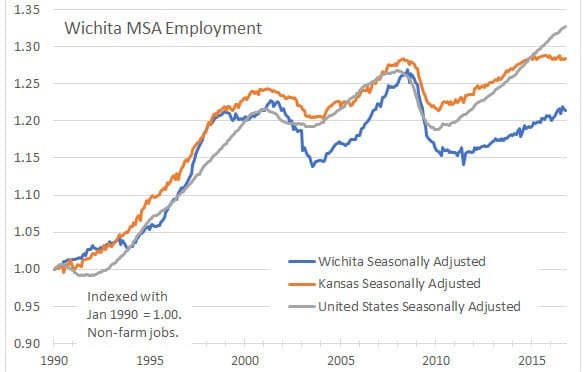Search results for: “Key Construction”
-

Kansans voted for growth, not stagnation
Kansans need of a new way of thinking. They won’t get that from a Democrat or Republican as governor, writes Michael Austin, Director of the Sandlian Center for Entrepreneurial Government at the Kansas Policy Institute.
-

The Wichita economy, according to Milken Institute
The performance of the Wichita-area economy, compared to other large cities, is on a downward trend.
-
More taxes for Wichitans
Expanding gambling in Sedgwick County will lower taxes and provide “…tax relief…,” according to casino advocates’ campaign flyer. This claim is preposterous in light of the soaring property tax hikes and spending expansion plans being generated by local government in our community.
-
Kansas school spending and achievement
From Dr. Walt Chappell, a discussion of Kansas school spending. Chappell served on the Kansas State Board of Education from 2009 to 2012.
-
Report from Topeka, July 1, 2005
Thank you again, Karl Peterjohn of the Kansas Taxpayers Network, for your insights into the Kansas Legislature’s special session. The Kansas house begins their 10:30 AM session with a constitutional amendment to reassert their fiscal powers in a key vote for this special session. Last Sunday a similar amendment failed getting only 73 of the…
-
Report from Topeka, July 3, 2005
Thanks again for this report from Karl Peterjohn, Executive Director Kansas Taxpayers Network It was a hard, long slog for the 11 days of the Kansas legislative session that began June 22. Using the phrase, “hard, long slog,” is one that Secretary of Defense Donald Rumsfeld had used in describing the war in Iraq. The…
-
Change in needed in Wichita
Change is desperately needed in Wichita — change to allow exceptionalism and end failed economic subsidies.
-

School choice and state spending on schools
States like Kansas that are struggling to balance budgets could use school choice programs as a way to save money.
-

Nation’s report card has little good news
This year’s results from the National Assessment of Educational Progress (NAEP) hold little good news. Following, the Center for Education Reform summarizes.